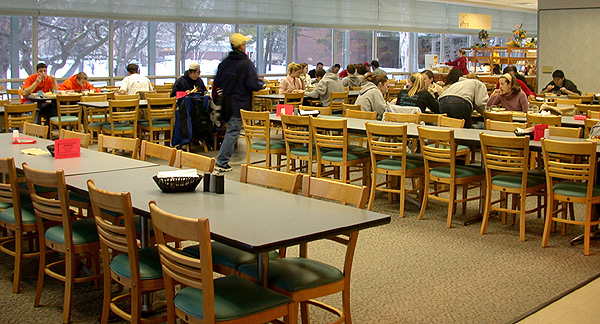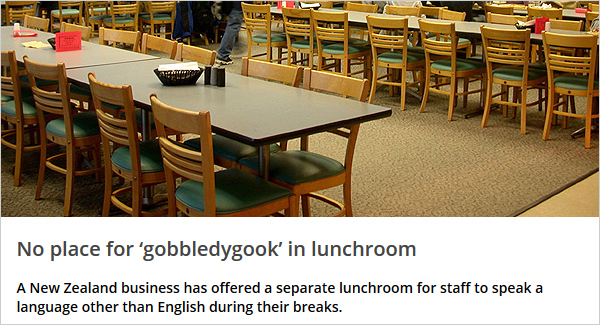2. News story.
Now read the story and answer the questions below.

No place for ‘gobbledygook’ in lunchroom
A New Zealand business has offered a separate lunchroom for staff to speak a language other than English during their breaks.
However, if they insisted on communicating in a language other than English during work hours they would be sacked, company director Brian Shapcott said today."It is non-negotiable. It is a health and safety issue."
Mr Shapcott said staff needed to communicate at the factory in South Auckland to ensure a very high level of quality control in the manufacture of medical laboratory supplies, and that required everyone to speak English.
All his staff could speak English perfectly, he said.
He had given several verbal warnings, but earlier this month he sent a memo to staff telling them they would be sacked if they spoke another language during the manufacture of medical laboratory supplies.
Mr Shapcott also wants staff to speak English during lunch breaks, but if they insist, he will be happy to provide a separate room for those who want to speak another language.
Half his staff were New Zealand–born, a quarter were Indian and the rest were of other ethnic origins.
The lunchroom was a place for staff to relax during their break, and when a foreign language, particularly "Indian", was spoken, it could create a "trying" and not a relaxing atmosphere, he said.
"Staff don't want to be hearing gobbledygook. It is like machine-gun fire. It is a staccato-type speech. I don't want to be critical, but it is not a smooth, quiet undertone. They get quite excited and some of the staff get upset," Mr Shapcott said. "It is very rude. It's like whispering behind somebody's back."
He said his staff were happy with his ruling and there had not been a problem since he issued the written memo.
"It looks like it's me versus the staff. It is not. It is the very antithesis of that. The staff all see it as perfectly reasonable," he said.
It was a happy workplace and Mr Shapcott says he gets on well with his staff, most of whom had been with him for many years.
Ataur Rahman, the honorary consul for the People's Republic of Bangladesh in Auckland, says it's unreasonable to threaten to sack people over the issue.
North Shore employers need to set clear policies about workers speaking foreign languages in the workplace, Mr Rahman says. "These are things we can all work through," he says. "It's going really over the top to threaten to sack somebody."
Mr Rahman says the "common sense" and "humanitarian" approach is to spell out to employees what the company policy is on the issue. Because of the growing migrant population, the country needs to come to grips with this issue now, he says.
Choose the answer you think fits best.
3. Words in context.
on the highlighted phrases and words and choose the correct meaning.

The lunchroom was a place for staff to relax during their break, and when a foreign language, particularly "Indian", was spoken, it could create a "trying" and not a relaxing atmosphere, he said.
"Staff don't want to be hearing gobbledygook. It is like machine-gun fire. It is a staccato-type speech. I don't want to be critical, but it is not a smooth, quiet undertone. They get quite excited and some of the staff get upset," Mr Shapcott said. "It is very rude. It's like whispering behind somebody's back."
He said his staff were happy with his ruling and there had not been a problem since he issued the written memo.
"It looks like it's me versus the staff. It is not. It is the very antithesis of that. The staff all see it as perfectly reasonable," he said.
It was a happy workplace and Mr Shapcott says he gets on well with his staff, most of whom had been with him for many years.
North Shore employers need to set clear policies about workers speaking foreign languages in the workplace, Ataur Rahman says.
"These are things we can all work through," he says. "It's going really over the top to threaten to sack somebody."
Mr Rahman says the "common sense" and "humanitarian" approach is to spell out to employees what the company policy is on the issue.
Because of the growing migrant population, the country needs to come to grips with this issue now, he says.
